For decades, toner has held a mysterious spot in skincare routines. We never knew whether we really needed one or if we could happily live without it.
In the past, toners helped restore the skin’s pH and remove any makeup left after cleansing. They were useful because back then, cleansers weren’t great at removing all residue and were often harsh, leaving the skin feeling tight.
Today, skincare has evolved a lot. Cleansers are now much more effective and far gentler on the skin. Toners have changed too. If a few decades ago they were harsh, alcohol-based liquids, now you can find them in all kinds of formulas.
Still, the big question remains: do you really need a toner, or is it just a product marketed to us by the beauty industry? This article will give you the answer, once and for all, to this skincare existential question.
What is a Face Toner?
The world of skincare has changed a lot over the years, and so has the role of toners. But one thing remains the same: a toner is a liquid product applied after cleanser and before serum or moisturizer.
Back in the day, toners were alcohol-based solutions designed to restore the skin’s pH balance and remove any makeup, oil, or dirt left after cleansing. They often made the skin feel tight, dry, and irritated.
Today, toners are generally gentler, pH-balanced, and come in different formulas, each tailored to specific skin needs:
- Hydrating toners: contain humectants like hyaluronic acid or glycerin that help your skin soak up moisture. These are perfect for keeping skin plump and refreshed.
- Soothing toners: are packed with calming ingredients like aloe vera, centella asiatica, or chamomile, which are great for sensitive or irritated skin.
- Exfoliating toners: contain gentle chemical exfoliants, such as AHAs, BHAs, and PHAs, which help smooth skin texture, fade dullness, boost your natural glow, and prevent clogged pores.
- Clarifying/astringent toners: usually made with alcohol or witch hazel, these toners help control oil and tighten pores, making them great for oily or acne-prone skin.
In short, “toner” is no longer just one thing — it’s a broad category that can serve multiple purposes depending on the ingredients.
The Benefits of Using a Face Toner
When chosen wisely, a toner can bring many advantages to your skincare routine. Here are the main benefits you can expect:
Preps the Skin for Better Absorption
A toner prepares your skin for the next steps in your routine. It hydrates and softens the surface while removing any leftover residue from cleansing.
Modern, pH-balanced formulas help your skin maintain its natural acidity, helping barrier proteins and enzymes function properly so your next products perform better. Some toners also include gentle actives, such as antioxidants, peptides, or light acids, which begin working immediately and create an ideal environment for serums and moisturizers to absorb and deliver results.
Delivers Extra Actives
Toners make the most sense if they provide something your other products don’t. For example:
- If your cleanser is gentle and you’re not using any exfoliating serums, a toner with mild chemical exfoliants can help smooth your skin and prepare it for serums and moisturizers.
- If your serum doesn’t include antioxidants or peptides, or you prefer not to layer multiple serums, a toner with these actives can fill that gap in your routine.
In this way, toners aren’t just “extras” — they can be a lightweight way to deliver benefits without needing another heavy serum or cream.
Adds a Refreshing Step
Beyond the skin benefits, applying toner brings a refreshing, uplifting touch to your routine, turning it into a small, satisfying moment of self-care.
The Downsides of Face Toner
While toners can bring some advantages, they aren’t always the miracle step they’re marketed to be. Let’s take a look at some of the downsides:
- Not Strictly Necessary:Many dermatologists agree that a healthy skincare routine can be complete without a toner. Having a good cleanser, moisturizer, and sunscreen often covers the essentials.
- Extra Cost and Time:Using toners means spending extra money and adding one more step to your routine, which some people might find unnecessary for their daily skincare.
- Risk of Irritation:Exfoliating toners with strong acids or alcohol-based formulas can cause stinging, dryness, or redness — especially for sensitive skin types. So make sure the formula you are choosing is the right one for you.
- Potential Redundancy:If your serum or moisturizer already provides hydration, soothing, or exfoliation, a toner may duplicate the same benefits rather than add something unique.
How to Choose the Right Face Toner?
If you decide to add a toner to your routine, the key is choosing the one that matches your skin type and goals. Here’s what to look for:
Dry or Dehydrated Skin
Go for hydrating toners to boost your skin’s moisture and leave it feeling plumper, softer, and more comfortable.
Avoid alcohol-heavy or astringent formulas (like witch hazel), as they can strip moisture and make dryness worse.
Oily or Acne-Prone Skin
Choosing a toner can be a lifesaver if you deal with oiliness or frequent breakouts. Because it’s lightweight and water-based, it can deliver gentle exfoliants, antioxidants, or peptides without the heaviness that some serums or moisturizers can leave behind. This helps keep pores clear, control oil, and reduce breakouts.
Avoidharsh or overly drying formulas (especially those with high alcohol content) as they can strip the skin and trigger irritation, inflammation, and even more oiliness or flare-ups. Stick with a gentle toner to maintain clear, comfortable skin without drying it out.
Dull or Uneven Skin Tone
Look for exfoliating toners to help your skin appear more glowy, reduce dark spots and hyperpigmentation, and smooth rough texture.
Avoid harsh scrubs or over-exfoliating acids, as they can damage your skin’s barrier.
Sensitive or Irritated Skin
Opt for soothing toners to calm redness, ease irritation, and make your skin feel more comfortable. Over time, they can also help strengthen your skin’s barrier, making it more resilient to everyday stressors.
Avoid fragrances, witch hazel, strong acids, and high-alcohol formulas, as these can trigger redness or irritation.
Combination Skin
Go for lightweight toners that provide hydration without feeling heavy, such as formulas with green tea or rose water. They help keep oily areas under control while moisturizing dry patches.
Avoid heavy oils and harsh astringents, as these can worsen oiliness or dry out already dry areas.
Mature Skin
Pick toners with hydrating, antioxidant-rich, or gently exfoliating ingredients (like AHAs, niacinamide, hyaluronic acid, or peptides) to improve hydration, elasticity, and texture.
Avoid harsh alcohols, strong acids, and rough scrubs that can increase dryness and sensitivity
Who Might Skip It Without Problems?
Not everyone needs a toner — in fact, many people do perfectly well without one. You might not miss it if:
- You Prefer a Minimal Routine:A simple routine of cleanser, moisturizer, and sunscreen already covers the basics for healthy skin. Toner is optional, not a mandatory step.
- Your Cleanser and Treatments Do the Job:If your cleanser is gentle and pH-balanced and your serums or moisturizers target your skin concerns, a toner may not provide additional benefits.
- You Have Extremely Sensitive Skin:Some toners — especially exfoliating or fragranced ones — can irritate easily reactive skin. Skipping toner altogether may reduce the risk of flare-ups.
- You’re Budget-Conscious:Since toners aren’t essential, skipping them can be a practical way to simplify your routine and save money without compromising skin health.
In short, toner is nice to have, but not using one won’t harm your skin if your other products are well-chosen.
How to Use Toner Safely?
- Avoid Harsh Alcohols:Unless recommended by a dermatologist, avoid old-fashioned alcohol-heavy toners, as they can strip the skin and cause irritation.
- Start Slowly with Exfoliating Toners:If your toner contains chemical exfoliants, introduce it gradually into your routine (2–3 times a week) and watch how your skin reacts.
- Look for Fragrance-Free Options if Sensitive: Fragrances can be hidden irritants, so if your skin is reactive, opt for fragrance-free formulas.
- Always Patch Test New Products:Apply a small amount on your inner arm or behind the ear before adding it to your face routine to minimize the risk of irritation.
How to Use a Face Toner?
When it comes to applying toner, you have two options:
- The first one is to apply it using a cotton pad — perfect if you’ve been wearing makeup, because it helps clean any residue left.
- The second way is to simply pour it into your hands and gently press it onto your skin.
Use it once or twice a day, depending on your skin’s needs.
Conclusion
Toner has come a long way — from the harsh, alcohol-heavy liquids of the past to today’s formulas that can hydrate, soothe, exfoliate, and refresh. But that doesn’t mean everyone needs one. For some, the right toner targets specific skin concerns and boosts the effectiveness of their routine; for others, it may just add cost without offering much benefit.
Toners are most useful when they provide something your other products don’t — for example, a lightweight way to add exfoliants, antioxidants, or peptides. They can be especially helpful for oily or acne-prone skin, or for anyone looking to layer in targeted actives.
So, do you really need a toner? Not necessarily. You don’t need one to have healthy skin, but you might enjoy it if it fits your skin type and goals. Think of toner as a customizable add-on, not a requirement.
If you’re happy with a simple routine of cleanser, moisturizer, and sunscreen, then a toner may not be necessary. But if you want to take your routine a step further, the right toner can improve your skin’s feel and appearance. At the end of the day, the best choice is what keeps your skin healthy and balanced, while fitting your lifestyle and budget.
Don’t forget, before buying a product, always ask yourself: How can this product help my skin look and feel better?


